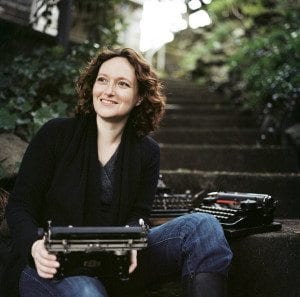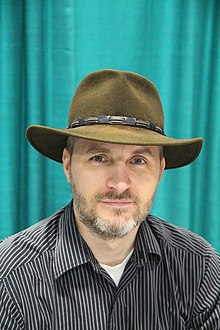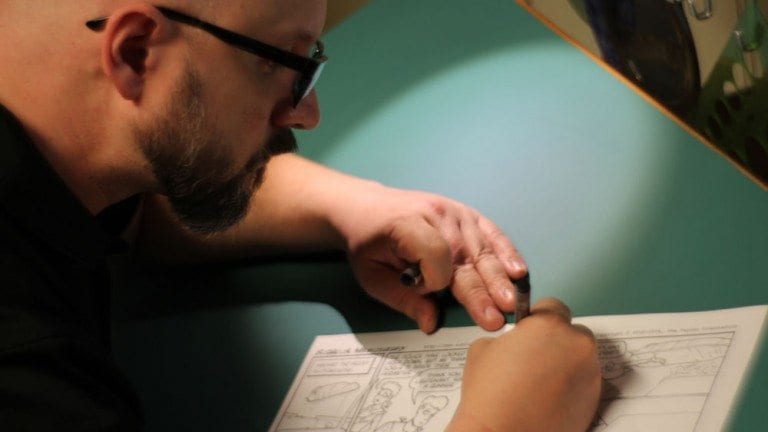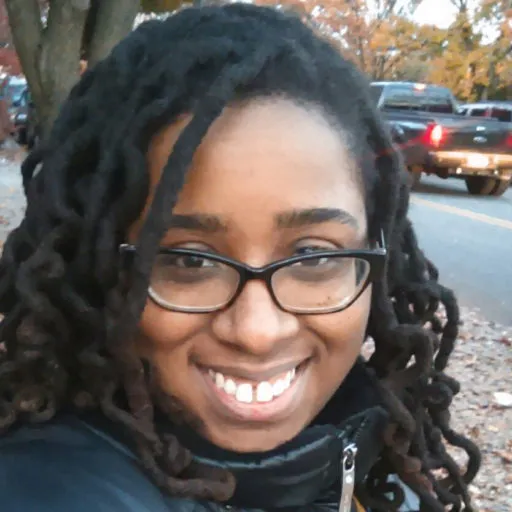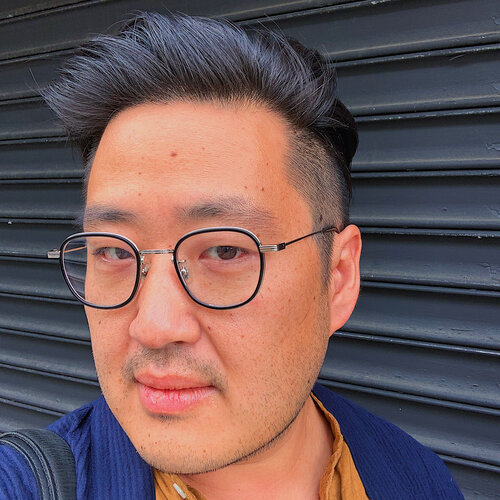Stagnation – and an epiphany
As mentioned in my last post, I’ve been working on a new fantasy series. What I didn’t mention was that, for the first time in my writing career (published and unpublished), I’ve had moments of genuine stagnation with it.
That’s not to say I haven’t hit brick walls before – I have. Many times. But in the past I’ve written my way through them. This time, though, it’s felt different.
For a while, I thought it was because I have a day job that stretches my brain, plus a busy lifestyle – but I’ve never been a full-time novelist and I’ve always managed in the past. Then I wondered if it was because I don’t have a deadline.
Reality bites
Last week, I discovered it was because there’s a hole in what I’ve been working towards with the new trilogy.
I hadn’t joined enough dots in my plotting for the third and final book in the series, which was causing me challenges while drafting the second. It was one of those ‘aha’ moments that made me wonder how I ever thought the series could work without this particular plot thread being strengthened.
In truth, I’ve had a similar process for all five of my published novels, so it shouldn’t come as a surprise. Apparently that’s my process!
This latest epiphany, though, didn’t fall out of the sky into my lap. I’ve had to dig for it. And, along the way, I’ve rediscovered the value and reward of the collective wisdom of the writing community. I’ve also discovered that having software that suits your writing needs is pretty handy.
For those of you who are writers (or just interested in the process), here are two resources that are helping me stay connected with, and dig deeper into, my writing.
Podcast: Writing Excuses
This US-based podcast has been going for more than a decade, and I’m embarrassed to say I only discovered it last year. I’m now officially obsessed.
It covers topics that, at first glance, I often think, ‘I’m okay with that stuff’. And then I listen to the hosts discuss their own experiences, challenges and solutions, which prompts me to think about those things in the context of my own work.
Without fail, every episode sparks an idea (and, on good days, a full-blown epiphany). It might be something small, or it might be a new way to tackle an issue in my current project. Or, better yet, it helps me identify an issue I didn’t realise I had.
And it’s about speculative fiction!
There’s a focus on fantasy and sci fi, with discussions including TV, film and table-top game references, as well as prose. Right up my alley. I like that each episode is around 15 minutes long, and is well structured.
On the days I drive into work for my day job, it’s a two-hour round trip, so I’ve been binging my way through current and past series. The challenge, of course, is holding new plot/character ideas in my head while driving, given Siri refuses to take a voice memo without me opening the app.
If you’re a writer, especially a YA spec fic writer, I cannot recommend this podcast enough if you’ve not discovered it (which you probably have).
The hosts
The podcast is hosted by Mary Robinette Kowal, Dan Wells and Howard Taylor, with new additions in 2023: DongWon Song and Erin Roberts. (Brandan Sanderson is a founding host and this year has officially stepped aside to concentrate on other commitments.) The photos below link to their bio info.
Podcast: I listen on Apple Podcast, but no doubt you can find this on your favourite podcast platform. The podcast on Apple is referred to as ‘Season 14’ but it’s up to date, including the first episode of 2023’s Season 18.
Writing platform: Scrivener
Yes, I know, I know: writers have been using this tool for YEARS. I remember looking at it when I was working on The Undercurrent and thinking I was doing just fine old-school-style, with my single Word doc file, notebooks, scraps of paper and endless supporting docs and web links.
Fast-forward a few years and my writing practice has become wedged between work at the day job, my consultancy side-hustle and the ride-on mower. The piecemeal nature of my writing sessions means it’s harder than ever for me to keep track of characters, plot and world building in a complex story.
After hearing Scrivener mentioned often in the above podcast, I looked it up and decided to give it a go. I signed on for the free 30-day trial and less than 48 hours later I bought my full-price subscription. Honestly, it’s been like shifting from a typewriter to Word (yes, I’m old enough to remember what that was like). It has, quite literally, changed my writing life.
I only mention it here because it’s helped me, and I can’t stop banging on about it. Again, if you’re a writer, you’re probably all over this already.
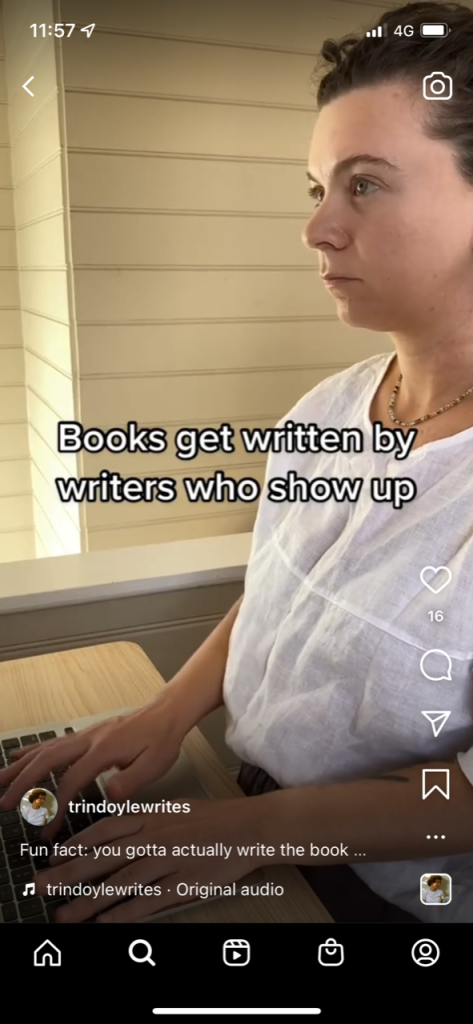
And a bit of inspiration…
Whenever I need to remind myself why I love writing, especially when it gets hard, I usually reach for my battered copy of Bird by Bird by Anne Lamott, beloved by writers everywhere.
Of late, I’ve also been checking out posts by @TrinDoyleWrites, an Instagram account from Australian YA writer, Trinity Doyle, author of the fabulous Pieces of Sky.
Trin’s posts are all about ‘writing tips, sustainable creativity and book whispering’. She’s fun, honest, and prepared to be vulnerable to stay authentic.
Much like Bird by Bird, Trin’s tips remind me that the creative process is frequently hard, occasionally mystical and always different for everyone – whether you’re published or not.
This boy and the view helps, too.:)

About those 50,000 words…(@NaNoWriMo)
You might remember I put my hand up to participate in National Novel Writing Month, where the goal was to write 50,000 words during November.
 I thought it would be a great opportunity to churn out a few words for Rephaim #3. I didn’t think 50,000 was realistic for me, so I set out to hopefully manage 25,000 – 30,000, which would’ve really kicked my working draft along.
I thought it would be a great opportunity to churn out a few words for Rephaim #3. I didn’t think 50,000 was realistic for me, so I set out to hopefully manage 25,000 – 30,000, which would’ve really kicked my working draft along.
So…how did I do?
I surprised myself. I didn’t hit 50,000 words but I managed to get down 42,800 or so. So now I have more than 60,000 words in my first draft, and I’m rapt. Book 3 has a lot going on – lots of reveals and plot twists, all to set up for the big finale of Book 4. So getting a rough draft on the page has been top of my list of priorities. Once I have that, I can then pull it apart, play with it and then polish up the writing. And now I’m 42,000 words closer.
Thanks to NaNoWriMo – and the support of my NaNo writing buddies Mia K Rose and Nomes – I’m much further progressed than I thought I’d be at this point. And I’m quietly happy with how the plot developments and story arcs are coming together. LOTS of tweaking to do, and more to write, but I just love having something to work with.
The great thing about having a month dedicated to writing – that you publicly commit to – is that you actually do it. You tell family and friends, you prioritise around it. And you have fun. I really enjoyed the process. Some days the words came easier than others, but I never forced it. At the end of the day, the target was nowhere near as important as getting it right. No point writing 50,000 words I’d just have to re-write because I rushed. But the story started to flow, and that’s a beautiful feeling. (Don’t get me wrong, I’m still pretty chuffed to have passed 40,000 words too).
Thanks particularly to Mia – and our 5,000 word weekend challenges. Mia hit her target – flew past it actually. It definitely helped having writing buddies to chat with about progress, frustrations, small victories.
So, if you’re a writer looking for an excuse to lose yourself in words for a whole month, I recommend NaNoWriMo next year. I’ll be back (working on Rephaim #4!).
Q&A with my editor
While I was Writer in Residence over at Inside A Dog last month, my wonderful Text Publishing editor Alison Arnold and I had this genius idea for a post in which I would ask her a few questions about editing.
We didn’t quite get organised in time to run it on Inside A Dog, but I think it works just as well here. And thanks again Ali – these answers are great. 🙂
What do you look for when considering YA manuscripts?
Books that make me miss my train stop. (Awkward, since I take a V-line home.) Books that feel fresh and unforced. Books where at the start I notice how gorgeous the writing is and at the end I barely notice it at all because I’m so engrossed in the story. Books that tells stories. Books with crush-worthy characters. Like Rafa (Gaby’s love-interest in the
Rephaim), or Wolfboy (Nia’s love-interest in Leanne Hall’s This Is Shyness and Queen of the Night). There were quite a few people who read Shadows before it went to press and without exception they all emailed me to tell
me they’d fallen for Rafa. My favourite email was two words long: Rafa. Swoon. The best writing going on at the moment is in the YA field. I just love it.
What is your favourite part of the editing process?
I love the beginnings when I don’t have to make hair-tearing-out decisions about persnickety things like styles and whether hell-beast is one word, two or hyphenated. I love helping an author to dream big across their story. After that, I next love continuity. I know this is weird, but I enjoy figuring out that the thing a character said happened on a Monday actually happened on a Wednesday and pulling that little thread that threatens to pull the book’s timeline apart. I love the very hilarious conversations that end up happening with my authors and I quite enjoy emailing back and forth about a thousand times a day. ‘So, in the email you sent at ten with the subject line “I can’t believe this one got
through”, I’m not quite sure what you meant about my comment on page 43, para two.’ Oh, okay. I don’t love that quite so much.
As an editor, do you focus on one thing at a time?
I don’t work very rigidly when I edit, as in I don’t organise my time into a structural edit, a copy edit, a line edit. At the beginning you are mainly working on structure, but whatever you see on the line you pick up. At the end you are mainly working on the line. Finding major plot-holes shortly before press always makes you feel like vomiting. Often not knowing whether hell-beast is one word or two makes you feel like vomiting too.
Can you read a book without wearing your editor’s hat.
Yes! Or I would have to quit my job.
What happens if an author or editor disagree on revisions?
It doesn’t happen as often as you might think. Editing is more of a conversation than I imagine aspiring writers think it might be. It’s not so much a red pen ‘do this, do that’ type process, but a long, ongoing discussion. I would always plead my case, but I also pick my battles. Some things are more important than others and, when the book is out, my name is not on the cover.
What is your all-time favourite book?
My all-time favourite kids book is Homecoming by Cynthia Voigt. Lately I have been inhaling anything written by Maggie Stiefvater. The first character I fell in love with was Lord Peter Wimsey in Dorothy L. Sayers 1920s detective books. I was thirteen. He was forty-five and ugly. I didn’t care. The last character I fell in love with was Rafa in the Rephaim series. I am also a huge fan of Cath Crowley, Simmone Howell, Kelly Link, Leanne Hall, Vikki Wakefield. (Ali reserves the right to add to this list when she thinks of writers she’s missed!)
Books, films, editing, rejection…we've talked about it all these past two weeks
We’ve had more interesting discussions over at Inside A Dog these past two weeks:
- Books into films (upcoming releases, and other possibilities)
- Paranormal fiction and urban fantasy (what’s the difference?)
- My favourite reads (short version)
- Adventures in editing (an insight into some of my challenges)
- Dealing with rejection (at least in the world of publishing)
- Angel-themed gifts (and a revisit of some of my best booky things)
Last guest post for the month still to come…
This week's topics at Inside A Dog
What have we been talking about over at Inside A Dog this week?
- How the cover for Shadows came about (including an earlier draft concept – see below).
- Word changes in the UK version of Shadows (and what that means for the Butler brothers).
- A few thoughts on paranormal stories and why they resonate.
I’m really enjoying interacting with readers at Inside A Dog. Can’t believe my residency is almost half over. Next up on Monday will be a small peek into the world of line editing.
Here’s the earlier cover concept from Text Publishing’s brilliant in-house artist WH Chong. Read my post at Inside A Dog to find out the story behind it…
Don’t forget, I’ll be at Riverlink Angus & Robertson in Ipswich tomorrow, 10am-12.30pm.
